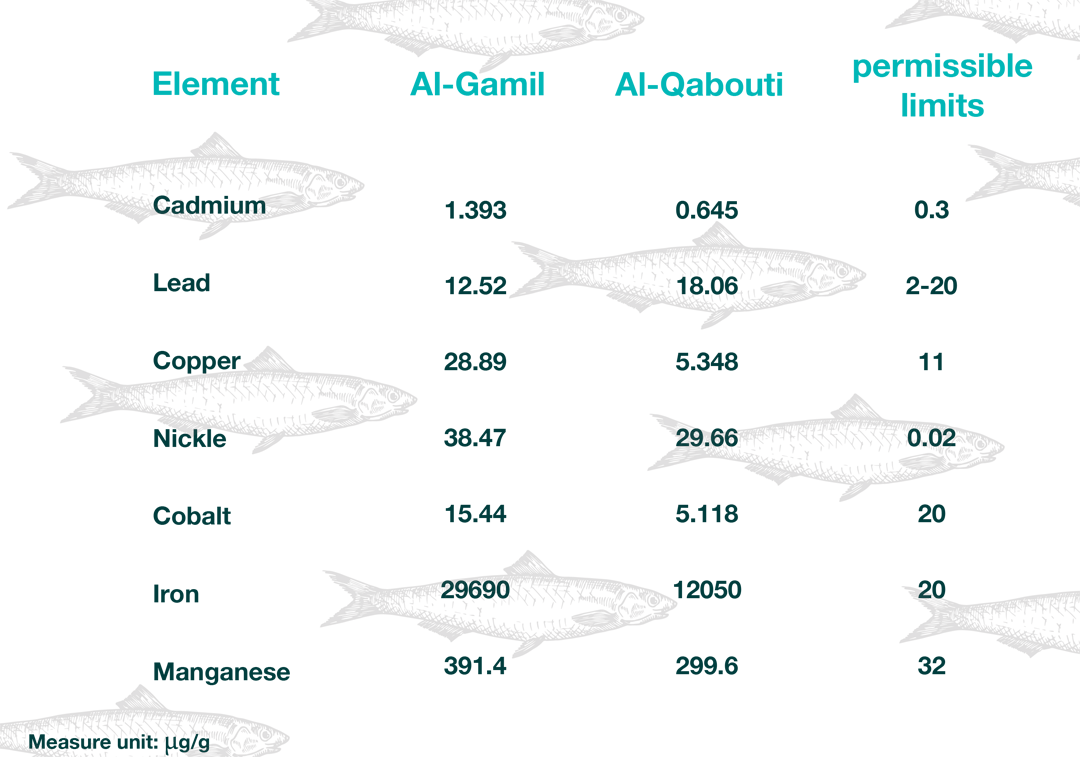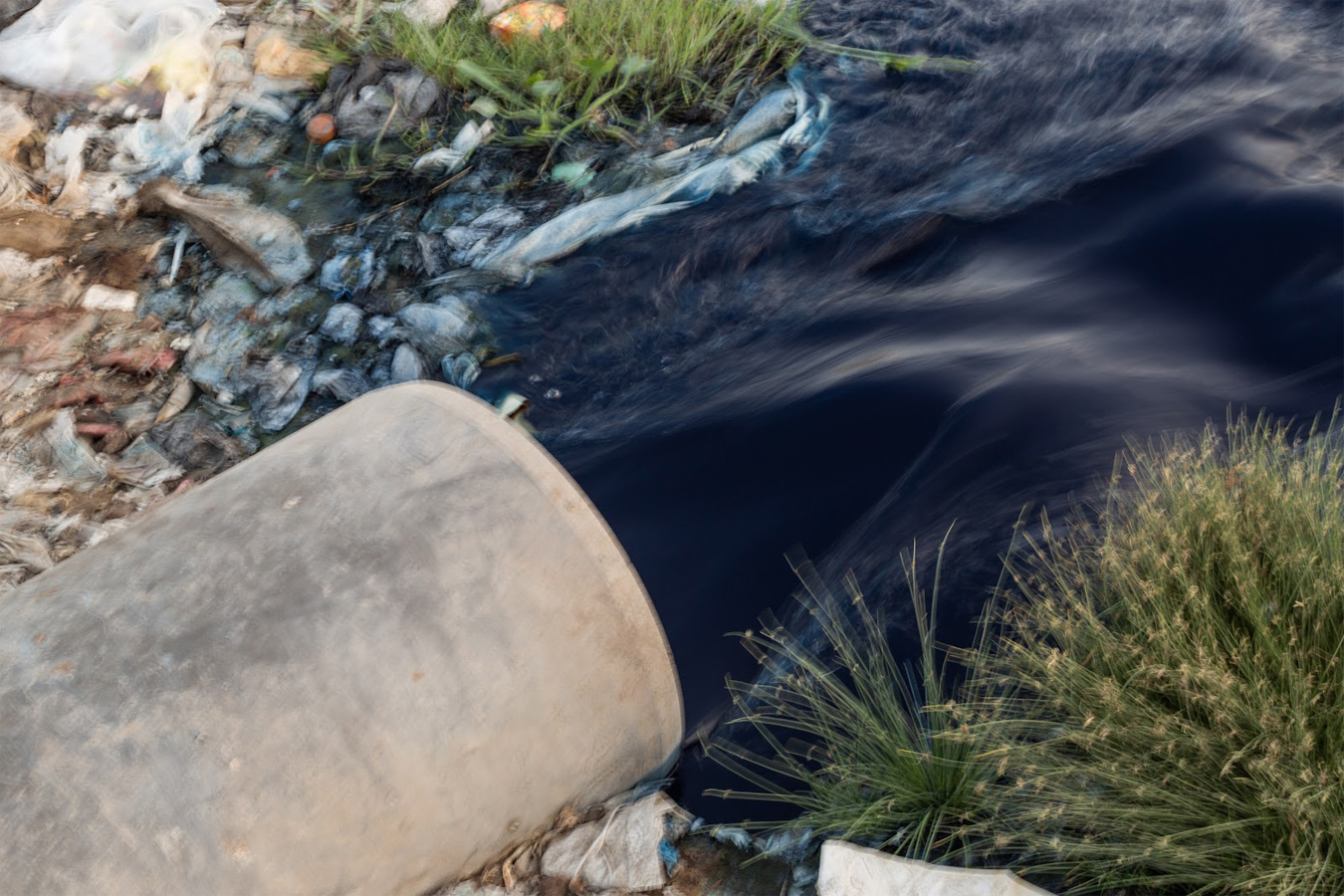




Abbas smiles, remembering the days of full nets. However, he soon frowns when he thinks of the region’s hardships. The waters of Al-Qabouti have turned a gloomy blue, and most of the fishermen have left.
التسرب النفطي المتكرر يتغلغل أيضا للشعاب المرجانية - حاضنة الأحياء البحرية- وسط ضعف هيئات حماية البيئة والبترول وعدم التزام شركات نفط بقوانين حماية البيئة والتنقيب البحري. يفاقم المشكلة تراشق بالاتهامات بين وزارة البيئة وهيئاتها الرقابية وبين الشركة العامة للبترول، المتهم الرئيس بتلويث البيئة هناك، بحسب ما يكشف هذا التحقيق.


Al-Qabouti is situated between the northern bank of the Raswa Canal, which connects Manzala Lake to the Suez Canal; the western bank of the internal canal, which connects to the heart of Port Said; and the eastern bank of the navigational tongue, which divides into Lake Manzala.

جهاز شؤون البيئة سجّل 25 واقعة تسرب بترولي بمدينة رأس غارب بين عامي 2015 و2019. في 22 منها، حمّل الجهاز الشركة العامة للبترول مسؤولية التلوث على امتداد الشاطئ، واتهمها بخرق قوانين صون البيئة البحرية. على أن الشركة خرجت بالبراءة في عدد من تلك القضايا، مستفيدة من "شيوع الاتهام"، وفق قرارات المحاكم. كذلك طول أمد التقاضي، الذي تضمحل خلاله ملامح التلوث فيصعب ربطه بالمتسبب.
بموازاة ذلك، أظهرت نتائج تحليل ثلاث عينات تطابق بصمة الزيت - المتسربة بين ديسمبر/ كانون الأول 2018 و فبراير/ شباط 2019- مع مخرجات حقول الشركة ذاتها وآبارها بنسبة تتعدّى 99 %. تتناقض نتائج تلك التحاليل - التي حصلت معدّة التحقيق على نسخة منه - مع دفوع الشركة في جميع القضايا المرفوعة ضدّها، على قاعدة أن "بصمة" الزيت موضع الشكاوى تتماهى مع تسربات من شركات أخرى.
على أن رئيس الشركة العامة نبيل عبد الصادق يرفض نتائج الفحوص ويتهم جهاز شؤون البيئة بالتخلي عن دوره في تدقيق البحث عن الآبار المسربة للنفط والافتقار إلى أدوات قياس حديثة لتحديد المتسبب الحقيقي.
على مسافة 314 كيلومتراً جنوب شرقي القاهرة تقع مدينة رأس غارب، التي يقطنها 41 ألف و526 شخصاً حتى نهاية 2019
وفق جهاز التعبئة والإحصاء. يخرج من هذه المنطقة 67 % من مجمل إنتاج الزيت الخام والمتكثفات بمصر، المقدر حالياً ب 630 ألف برميل يومياً، بحسب وزير البترول طارق الملا.
وتنتج الشركة العامة للبترول وحدها 37 ألف برميل يومياً من حقول رأس غارب، بحسب تأكيد مديرها الحالي نبيل عبد الصادق لمعدّة التحقيق.
“The sea was mocking us. Every day, I used to fish about 100kg. Now that there are no more fish, I must travel to another region far from Qabouti, which is also polluted but to a lesser degree,” Abbas tells us. He wonders out loud why anyone would choose this profession now, with all its difficulties, but does not wait for a response. “What a travesty”.
Every day, Abbas sees sewage flowing from factories. He hopes his children do not inherit the career that he and his brothers once adored. “I pray that my children and loved ones do not become fishermen one day.”
يرى عباس مياه الصرف تتدفّق كل يوم من المصانع. المهنة التي أحبها عباس وعشقها إخوته يتمنى ألاّ يرثها أولاده، "بحلم إن ربنا ميوريش شغل الصيادين لحبايبي وعيالي".
In a 2018 study of heavy metal contamination published in the Asian Journal of Fisheries and Aquatic Research, researchers Nabil Azaz and Mokhtar Bashiri collected water and sediment samples from the navigation channel and the industrial zone south of Port Said in the Al-Qabouti region. They concluded that the highest average concentration of heavy metals in water samples was clearly observed during the summer, and that firms in the industrial zone south of Port Said are to blame for the deteriorating circumstances.
The study shows that heavy metals detected in the aquatic environment in the Al-Qabouti area are hazardous, non-biodegradable and easily accumulated in living organisms, and that their presence has increased greatly due to industrial waste. Toxic heavy metals have an impact on the ecology, particularly bioaccumulation.

In July 2019, Parliamentary Representative Khaled Abu Talib filed a briefing request against the TCI Sanmar factory in the Port Said Industrial Zone, based on its unprocessed industrial waste in the Qabouti area. He pointed out that the chemical factory, along with five others, discharged industrial wastewater amounting to 1.5 million untreated cubic metres per day into Manzala Lake, endangering the fish.
The same request was made again on August 4, 2021, when Parliamentarian Hassan Ammar submitted a request for briefing to the Prime Minister and the Minister of the Environment over the pollution caused by the factory. Ammar pointed out that the factory exposes the residents of the Qabouti area to all kinds of environmental pollution, damaging their health, in addition to the frequent incidents of asphyxia among factory workers and its failure to meet occupational safety and security standards.



According to the fifty-year-old fisherman Abbas Zakaria, the number of fish in the Al-Qabouti area has fallen dramatically, and sometimes there are none at all. Many types of fish and sea life have disappeared, including hashman, mullet, seabass, plaice and crab.
The Egyptian Mobilisation and Figures Authority's annual bulletin of fish production statistics validates these claims: the volume of fish captured in the Al-Qabouti area has fallen dramatically.

TCI Sanmar is one of Egypt's largest chemical and chlorine factories, producing chlorine used to purify drinking water. Investment in the plant totals over $1.2 billion, making it the largest Indian investment in Egypt's chemical industry. The factory was built in 2002 by an Indian company called Trust, and sold to an Indian investor in 2007. Later, the main activities were transferred to an Indian-managed chemical and petrochemical factory. However, according to a case file against the plant, a copy of which was obtained by the investigator, violations in maintenance work and safety began to manifest in 2011.

Ahmed Youssef, a resident of Port Said's Emirati region adjacent to the TCI Sanmar factory, has filed many complaints against it since 2017, citing harmful emissions and discharge into Lake Manzala. He has also started an internet campaign to expose the firm’s environmental violations, and says local people suffer the most from the pollution. “Every day we wake up with a strong smell of raw chlorine, and there were several incidents of asphyxia among children in the area in 2017”.
The fishermen in the Al-Qabouti area, however, have paid the highest price for pollution. In addition to the previous impact of fishery destruction, many fishermen have documented with their phone cameras the factory's release of polluting materials into the waterway that connects Lake Manzala with the Suez Canal.
The Sanmar factory produces a number of polluting substances, such as caustic soda, chlorine, oxygen water, ethylene derived from ethanol, and ethanol dichloride, all discharged into the lake.
In response, lawyer Ahmed Muhammad Amer filed another complaint against the factory, No. 333 of Judicial year 6, related to the factory's hazard to citizens' public health.
The court ruled on November 21, 2018 that it required the appointment of an environmental expert to inspect and report the extent to which industrial drainage from the facility meets the authorised limits under Egyptian environmental law.
Case sentence PDF

حكم القضية PDF
According to Amer, the factory pollution affects not only the Al-Qabouti area and the Emirati neighbourhood, but the entire Port Said Governorate, as the resulting air pollution can harm other neighbourhoods and industrial drainage into Al-Qabouti Canal affects all fish eaters from the area.
His lawsuit against the factory is the first of its type. He says the case is nearly successful and that a decision has been made condemning the business, based on the papers he had obtained; but a delay in response from the environmental expert assigned by the court means a ruling has yet to be issued.
Abbas Zakaria and his few remaining fellow fisherman in Al-Qabouti went to try fishing in the Ashtum Al-Jamil area (part of Lake Manzala), in the hope of finding fish that they could sell after industrial drainage eliminated their own – but the pollution preceded them, as strong waves carry it all the way there too.
Al-Tamimi Abu Al-Magd has lived in Ashtum Al-Gamil, Port Said, for sixty years, more than three-quarters of his life. He has witnessed its glory days, its decline and the attempts to change it. Born in Manzala in Dakahlia Governorate, he has been a fisherman since his youth.

His day begins at 2am when he goes out to catch fish, returning to sell them to merchants. He returns at 8am to patch and repair his nets.
But this place, the focal point of his existence, has been ruined by factory waste. “Pollution damaged the lake. The city suffers as a result of factory owners. It costs billions of dollars per year to repair garbage, but industries return and discard their waste”.
The nets of the old fisherman come out loaded with about 10 kg of fish, but about 8kg are already dead. “The fish escape, because the water is like sewage. The fish that can escape to a more merciful place do so. For those who can’t, their fate will be death”.
Al-Tamimi gets three pounds per kg of fish. His daily income is now only six pounds. He wonders: “How can six pounds support a family of six children?”.
The investigator collected samples of water, soil and fish in the Al-Gamil and Al-Qabouti areas; the pollution rates in all samples exceeded the international permissible limits as well as the limits established by the Egyptian Environmental Law.
However, the Al-Qabouti area was more contaminated than the Al-Gamil area. Dr Khaled El-Moslehi, Professor of Marine Environment and sample analyst, explains that the latter is close to the open Mediterranean Sea, which renews the waters through the El-Gamil Bogaz.
According to Maha Ghanem, former Head of the Poison Centre at Alexandria Medical School, heavy metals are naturally occurring elements with a large atomic weight and a density at least five times that of water. They have an impact on both human health and the environment, with toxicity based upon a number of factors – dose, method of exposure, chemical species – as well as the age, gender, genetics and nutritional state of those exposed.
Arsenic, cadmium, chromium, lead and mercury are the metals of most public health relevance, due to their high toxicity. These are systemic toxins that can damage many organs, even at low levels of exposure. The US Environmental Protection Agency and the International Agency for Research on Cancer have both classed it as a human (known or probable) carcinogen.
Al-Tamimi, who has lost the majority of his companions to disease and pollution, is still clinging to the lake; he has no other source of income.
Al-Tamimi, who has lost the majority of his companions to disease and pollution, is still clinging to the lake; he has no other source of income.
The seventy-year-old fisherman's weekly work ends on Thursday morning, when he travels to his family in a village in Manzala. He gives his wife a few pounds, barely enough for a day or two. Then he goes to meet his friends, former fishermen forced to retire due to pollution and disease.
Malik Khader worked on Lake Manzala for almost 20 years. Despite being only 45 years old, he has been forced to retire due to renal failure. He has two dialysis sessions every week, paying enormous sums to treat the damage done by the lake's pollution.
Malik fears he will meet the fate of his uncle, also a fisherman, who suffered from renal failure and died in 2018.
Mohamed Abu El-Sadat, Malik's neighbour, was a fisherman in El-Gamil until he was forced to retire in 2020 due to renal failure. He has two sons (12 and 15) and a daughter who is engaged, but he is unable to prepare her for her wedding due to having dialysis three times a week.
Al-Tamimi and Abbas confirm that they know at least ten fishermen who have suffered renal failure and other diseases as a result of exposure to contaminated wastewater. A study conducted by a research team confirms that the industrial and sanitation drainage in the lake is a direct cause of the high levels of toxic substances such as lead, cadmium and mercury, which in turn may be a major cause of liver, cardiovascular, respiratory, digestive, urinary, musculoskeletal and skin conditions for fishermen.
One hundred fishermen working on Lake Manzala, along with one hundred working elsewhere, were given clinical examinations. The results reveal that the fishermen on Lake Manzala have far more problems with their heart, blood vessels, digestive system and urinary system, with evident hepatotoxicity compared to the other, healthy fishermen.
According to Dr Eman Abdel Moneim, Director of the Poison Centre, Faculty of Medicine, Cairo University, continuous exposure to industrial, sanitary or agricultural wastewater infects fishermen with diseases conveyed through contaminated water, such as cholera, giardiasis and typhoid. They may also contract pneumonia if the wastewater evaporates.
Al-Tamimi Abu Al-Magd completes his work in Al-Gamil, then heads to his village in Manzala to check on Malik and his other friends, who have been crippled by illness and forced to count their last days due to pollution.
Abbas Zakaria is still looking for another job. All he cares about now is finding work away from the lake, so that he doesn’t suffer the same fate as Malik and the other fishermen.